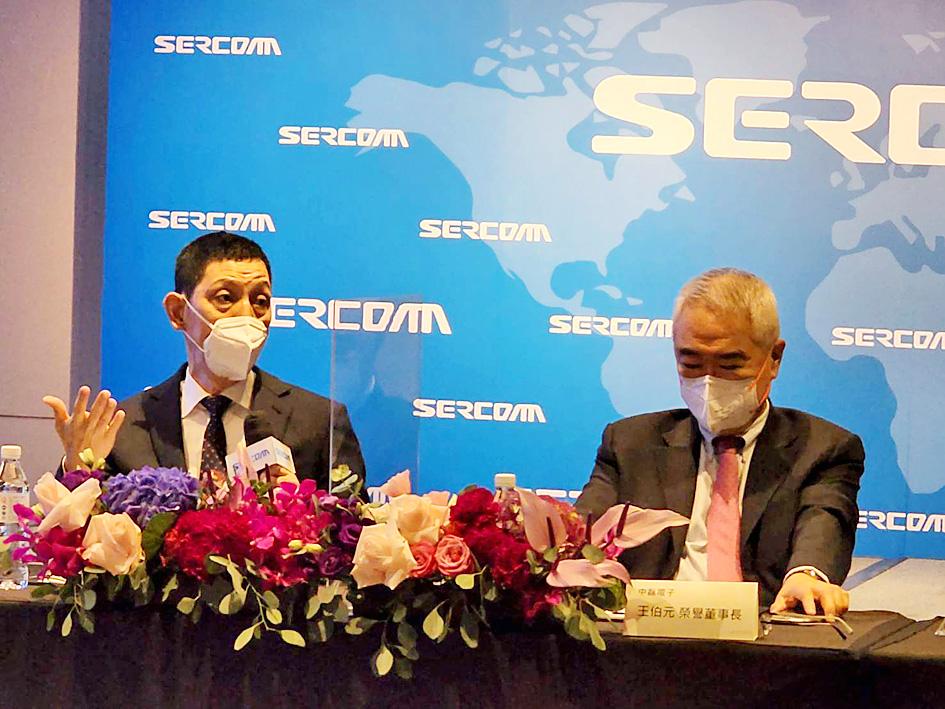Telecom equipment supplier Sercomm Corp (中磊) on Wednesday said that it has accumulated a large backlog of orders, thanks to resilient demand for broadband infrastructure deployment worldwide.
The backlog would keep shipments robust through the first half of next year, Sercomm said, adding that only 80 percent of orders can be filled due to component shortages and other supply chain issues.
However, this is an improvement over the worst period last year, when the fulfillment rate was only 60 percent, it added.

Photo: Wang Yi-hung, Taipei Times
Inflation has not dampened demand as more than 80 percent of its revenue comes directly from telecoms, not individual consumers, while major economies, such as the US, China, India and Japan, are spending heavily on infrastructure projects to stimulate their economies, it said.
“We have not gotten a strong sense that customers want to delay or cancel orders,” Sercomm chairman James Wang (王煒) said following the company’s annual shareholders’ meeting in Taipei.
“Surges in oil prices have not affected our customers,” Wang said. “Infrastructure is a segment that has a relatively stronger resistance to recessions.”
While people are not likely to cancel their Internet service because of economic woes, they do postpone speed upgrades, he said.
In addition, remote working and distance learning trends have boosted demand for wider Wi-Fi coverage with faster speeds, he said.
Based on orders received, Sercomm expects revenue this year to surpass US$2 billion.
In the first five months of the year, Sercomm’s revenue rose 38.55 percent year-on-year to NT$22.16 billion (US$750.52 million) from NT$15.99 billion in the same period last year.
Customers have not trimmed orders amid expectations of further COVID-19 lockdowns in China, which could trigger more supply chain and logistical chaos, Wang said.
The global electronics industry is still heavily dependent on Chinese supply chains, he added.
Sercomm aims to double its annual revenue to US$4 billion over the next five to 10 years by increasing shipping capacity and average selling prices.
The company is expanding its product scope beyond home gateways, and looking to supply 4G and 5G base stations for private enterprise networks, as well as street lamps connected to the Internet as part of smart cities.
Sercomm shareholders approved a proposal to distribute a cash dividend of NT$2.4 per share, which represents a payout ratio of about 70 percent, based on last year’s earnings per share of NT$3.44.

SEMICONDUCTORS: The German laser and plasma generator company will expand its local services as its specialized offerings support Taiwan’s semiconductor industries Trumpf SE + Co KG, a global leader in supplying laser technology and plasma generators used in chip production, is expanding its investments in Taiwan in an effort to deeply integrate into the global semiconductor supply chain in the pursuit of growth. The company, headquartered in Ditzingen, Germany, has invested significantly in a newly inaugurated regional technical center for plasma generators in Taoyuan, its latest expansion in Taiwan after being engaged in various industries for more than 25 years. The center, the first of its kind Trumpf built outside Germany, aims to serve customers from Taiwan, Japan, Southeast Asia and South Korea,

Gasoline and diesel prices at domestic fuel stations are to fall NT$0.2 per liter this week, down for a second consecutive week, CPC Corp, Taiwan (台灣中油) and Formosa Petrochemical Corp (台塑石化) announced yesterday. Effective today, gasoline prices at CPC and Formosa stations are to drop to NT$26.4, NT$27.9 and NT$29.9 per liter for 92, 95 and 98-octane unleaded gasoline respectively, the companies said in separate statements. The price of premium diesel is to fall to NT$24.8 per liter at CPC stations and NT$24.6 at Formosa pumps, they said. The price adjustments came even as international crude oil prices rose last week, as traders

SIZE MATTERS: TSMC started phasing out 8-inch wafer production last year, while Samsung is more aggressively retiring 8-inch capacity, TrendForce said Chipmakers are expected to raise prices of 8-inch wafers by up to 20 percent this year on concern over supply constraints as major contract chipmakers Taiwan Semiconductor Manufacturing Co (TSMC, 台積電) and Samsung Electronics Co gradually retire less advanced wafer capacity, TrendForce Corp (集邦科技) said yesterday. It is the first significant across-the-board price hike since a global semiconductor correction in 2023, the Taipei-based market researcher said in a report. Global 8-inch wafer capacity slid 0.3 percent year-on-year last year, although 8-inch wafer prices still hovered at relatively stable levels throughout the year, TrendForce said. The downward trend is expected to continue this year,

POWERING UP: PSUs for AI servers made up about 50% of Delta’s total server PSU revenue during the first three quarters of last year, the company said Power supply and electronic components maker Delta Electronics Inc (台達電) reported record-high revenue of NT$161.61 billion (US$5.11 billion) for last quarter and said it remains positive about this quarter. Last quarter’s figure was up 7.6 percent from the previous quarter and 41.51 percent higher than a year earlier, and largely in line with Yuanta Securities Investment Consulting Co’s (元大投顧) forecast of NT$160 billion. Delta’s annual revenue last year rose 31.76 percent year-on-year to NT$554.89 billion, also a record high for the company. Its strong performance reflected continued demand for high-performance power solutions and advanced liquid-cooling products used in artificial intelligence (AI) data centers,